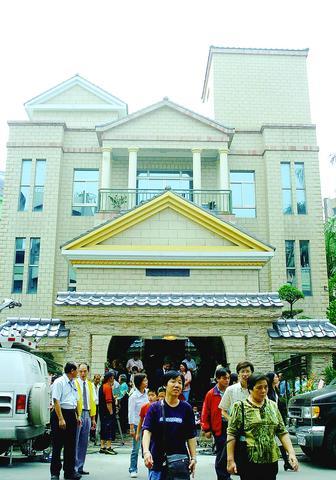Cult leader Sung Chi-li (
He did hold a press conference later, however, at his Kaohsiung residence.

PHOTO: CHANG CHUNG-YI, TAIPEI TIMES
"It wasn't my idea to open the shop. It was one of my followers in Australia who insisted me on doing so," Sung said.
"I am not going to do anything special there. It will only be a place, like a museum, to display my divine photos. It will also be a location for my followers to get together for all kinds of events," he said.
Sung said the 150-ping shop on Er-ling Road in the Hsiaokang district cost his Australian follower approximately NT$100 million.
Yang Chen-chih (
"It is a place for cultural exhibitions. Admission is free," Yang said.
However, only Sung's "divine photos" are on display. The photos usually show Sung with colorful rays of light in the sky and a ring of light around his head.
In 1996 Sung was sued by some followers -- and then indicted on charges of deception -- for obtaining NT$3 billion in donations by claiming to have "supernatural powers" which he could use to help people.
He was convicted of fraud and sentenced to seven years on Oct. 30, 1997, but the High Court overturned the verdict last year, ruling that his activities were simply religious activities, which are protected by the Constitution.
During his trial it was established that the "divine photos" of Sung were enhanced with basic computer graphics. The plaintiffs said Sung used the photos to win people's trust.
During the investigation of the case, Sung insisted that he had supernatural powers and that he could get people to do whatever he commanded.
The police invited him to display his powers in public, but he failed to persuade a police officer who was standing to sit down, despite repeated attempts.
Among Sung's more prominent followers are Kaohsiung Mayor Frank Hsieh (
During a radio interview on Sept. 26, Sung praised Hsieh for his decent character and good heart.
Sung said that Hsieh was the best choice for the Democratic Progressive Party's candidate for the 2008 presidential election.

Taiwan is stepping up plans to create self-sufficient supply chains for combat drones and increase foreign orders from the US to counter China’s numerical superiority, a defense official said on Saturday. Commenting on condition of anonymity, the official said the nation’s armed forces are in agreement with US Admiral Samuel Paparo’s assessment that Taiwan’s military must be prepared to turn the nation’s waters into a “hellscape” for the Chinese People’s Liberation Army (PLA). Paparo, the commander of the US Indo-Pacific Command, reiterated the concept during a Congressional hearing in Washington on Wednesday. He first coined the term in a security conference last

Prosecutors today declined to say who was questioned regarding alleged forgery on petitions to recall Democratic Progressive Party (DPP) legislators, after Chinese-language media earlier reported that members of the Chinese Nationalist Party (KMT) Youth League were brought in for questioning. The Ministry of Justice Investigation Bureau confirmed that two people had been questioned, but did not disclose any further information about the ongoing investigation. KMT Youth League members Lee Hsiao-liang (李孝亮) and Liu Szu-yin (劉思吟) — who are leading the effort to recall DPP caucus chief executive Rosalia Wu (吳思瑤) and Legislator Wu Pei-yi (吳沛憶) — both posted on Facebook saying: “I

The Ministry of Economic Affairs has fined Taobao NT$1.2 million (US$36,912) for advertisements that exceed its approved business scope, requiring the Chinese e-commerce platform to make corrections in the first half of this year or its license may be revoked. Lawmakers have called for stricter enforcement of Chinese e-commerce platforms and measures to prevent China from laundering its goods through Taiwan in response to US President Donald Trump’s heavy tariffs on China. The Legislative Yuan’s Finance Committee met today to discuss policies to prevent China from dumping goods in Taiwan, inviting government agencies to report. Democratic Progressive Party Legislator Kuo Kuo-wen (郭國文) said

The Ministry of Economic Affairs has fined Taobao NT$1.2 million (US$36,900) for advertisements that exceeded its approved business scope and ordered the Chinese e-commerce platform to make corrections in the first half of this year or its license would be revoked. Lawmakers have called for stricter supervision of Chinese e-commerce platforms and more stringent measures to prevent China from laundering its goods through Taiwan as US President Donald Trump’s administration cracks down on origin laundering. The legislature’s Finance Committee yesterday met to discuss policies to prevent China from dumping goods in Taiwan, inviting government agencies to report on the matter. Democratic Progressive Party